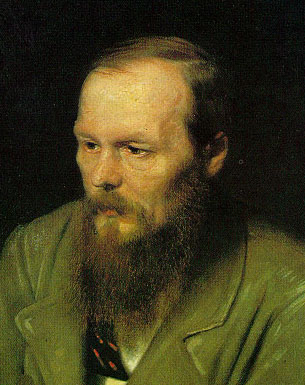Seeking an Atheism of the Absurd
 Now we're getting somewhere. David Gregory Moser has written a piece (found via Maud Newton) about what he finds lacking in the so-called New Atheists -- Dennett, Dawkins, Harris, Hitchens, et al. To get at his complaint, he calls on the existentialists, including Dostoevsky (pictured, right):
Now we're getting somewhere. David Gregory Moser has written a piece (found via Maud Newton) about what he finds lacking in the so-called New Atheists -- Dennett, Dawkins, Harris, Hitchens, et al. To get at his complaint, he calls on the existentialists, including Dostoevsky (pictured, right):The great Continental existentialist tradition running from Kierkegaard through Dostoyevsky, Nietzsche, and Camus approaches the absence of God in a manner radically removed from their Anglo-American counterparts. For the existentialists, the consequences of living in a world without providential design are of epic proportions. They see the challenges of life without God as demanding a creative struggle which is minimized by the Anglo-American skeptics and their New Atheist descendents. The unparalleled drama of Dostoyevsky’s novels, for example, is driven largely by the terrifying specter of life without God. Ivan, in The Brothers Karamazov, is the most compelling atheist character in the history of literature. Yet it is an atheism infused with a subtle ambiguity and irony which are very foreign to the exclamatory style of the New Atheists.Moser goes on to write about the importance of factoring absurdity into any world view:
The other existentialists likewise portray the evolution beyond God as a deeply troubling affair. Nietzsche, for his part, argued that life without the idea of God is actually other-than human, or super-human. He portrays religion as so historically intertwined with human life and thought that to move beyond it is also to re-imagine what it means to be human in the first place and requires a super-human effort. Kierkegaard characterizes the angst of doubt as a "sickness unto death." And Camus claimed that after the Death of God "suicide is the only serious philosophical problem." Compared to all this, the cozy, airtight arguments of the New Atheists are like childish bedtime stories.
(The New Atheists) do not acknowledge those who draw attention to the limitations of science and rationality from other angles: Not just the existentialists, but also the Sentimental and Romantic poets, the American Transcendentalists, the Surrealists, Dadaists, and all the Modernist novelists, just to name a few. Underlying the New Atheist arguments is a rather quaint, untroubled vision of science as a Great Emancipator which will establish a peaceable reign of reason, if only people would let go of their medieval beliefs. They are perfect exemplars of what Nietzsche, perhaps the most complete atheist in history, called "complacent rationality."I don't mean to pillage so much of Moser's essay. The whole thing is worth reading.
At the heart of this complacent rationality is an unquestioning faith in the ultimate intelligibility of the world. It is a style of thought that takes for granted that the world acts, as Hegel said, "in conformity with reason." It is a denial of absurdity.
I've often said -- because I'm the kind of dope who says things like this -- that one of the most important traits of anyone who's a good friend of mine is an ability to see the world as fundamentally absurd. Granted, I normally mean this in a funny, Simpsons-y way, not a Camus-y, suicide's-the-only-thing-worth-thinking-about way, but that's only because I don't want to bring the room down. For me, the public way to acknowledge absurdity is to laugh about it. The private way is to be massively depressed about it. Yes, this makes life a roller coaster for me, but I'm tall enough to take the ride.
Moser's focus on the absurd reminded me of one of my favorite passages from Camus, which I've shared before on the blog, and which almost perfectly encapsulates my world view:
If I see a man armed only with a sword attack a group of machine guns, I shall consider his act to be absurd. But it is so solely by virtue of the disproportion between his intention and the reality he will encounter, of the contradiction I notice between his true strength and the aim he has in view.This is how I feel about all of us, and about almost everything we do.
It's also why I have a hard time taking either the fundamentally religious or the fundamentally atheistic seriously. The former apply a repeatable story -- often so neat as to be able to fit into a single book -- to the ever-enlarging mysteries of the universe, so that the story quickly seems to appear like the sword mentioned by Camus. The latter do something I lately find just as insulting -- they claim that every emotional and psychological need (and experience) of humanity, many of which have existed since we wiped the primordial soup from our eyes, can be satisfyingly explained with reason. In this, I think they misrepresent both reason and emotion. And I wonder how many of them have read William James. (But more on him -- much more -- soon.)


1 Comments:
Just wanted to let you know that this was, and the original article, were fantastic reads. Thanks.
Post a Comment
<< Home